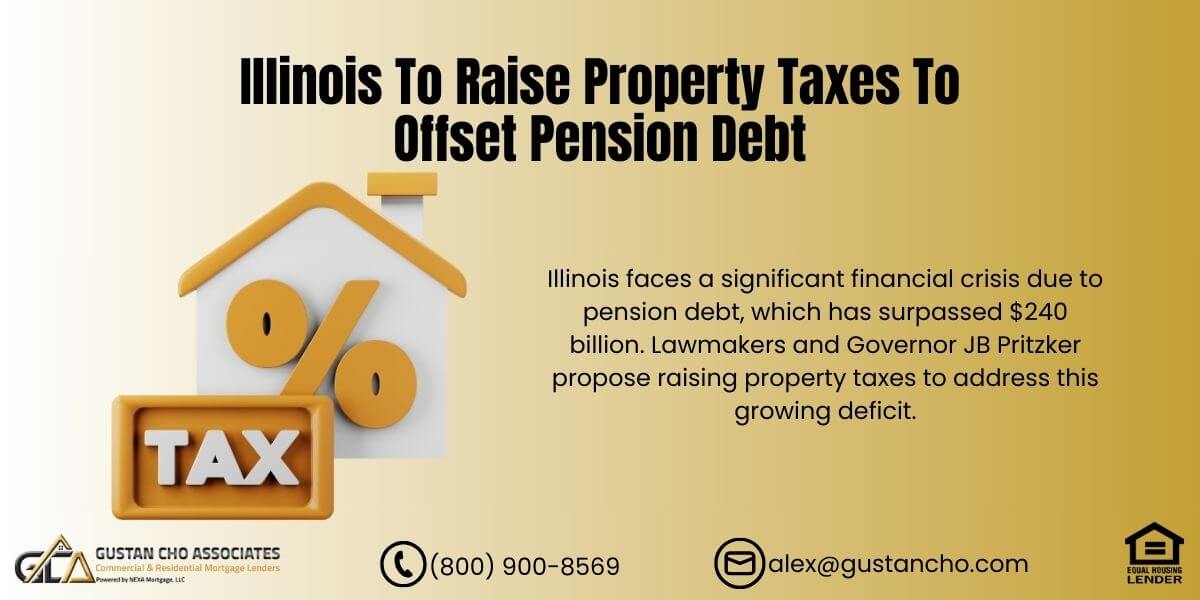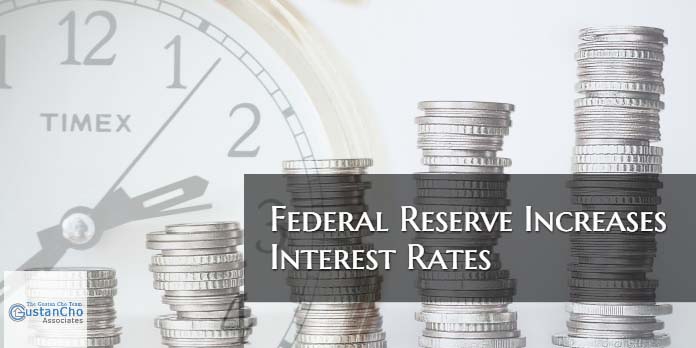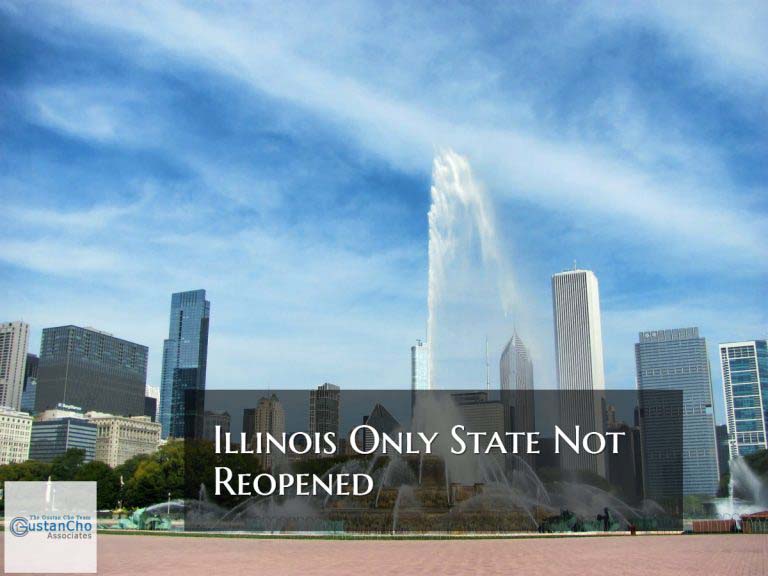Breaking News: Illinois to Raise Property Taxes—What It Means for You as a Homeowner
In 2024, Illinois homeowners are grappling with the possibility of higher property taxes as the state faces an ongoing financial crisis. Governor JB Pritzker and lawmakers have proposed increasing property taxes to address the state’s growing pension debt, which has plagued Illinois for decades.
This news has significant implications for homeowners, potential buyers, and even renters, as rising property taxes can affect the overall cost of living. If you’re a homeowner or thinking about buying or refinancing a property, understanding how these changes could impact your finances is critical.
In this article, we’ll explore:
- Why Illinois is raising property taxes
- How this affects homeowners
- Ways to prepare for these changes
- Opportunities to refinance or lower your housing costs
Why Is Illinois Raising Property Taxes?
Illinois has been financially bound for years, with pension debt the largest contributing factor. By 2024, the state’s pension liabilities have soared past $240 billion, making Illinois the worst-ranked state in the U.S. for pension debt.
A History of Financial Mismanagement
Over the past decade, Illinois has faced:
- Decades of underfunded pensions for teachers, state employees, and public servants.
- Rising costs that now consume over 25% of the state’s $40 billion general fund.
- Lack of meaningful pension reform due to legal and political hurdles.
Instead of addressing spending inefficiencies, Illinois lawmakers have increasingly turned to tax hikes as a solution. The state already ranks among the highest in the nation for property taxes, second only to New Jersey.
Start Your Process Towards Buying A Home
Apply Now And Get recommendations From Loan Experts
Illinois To Raise Property Taxes: How Will the Property Tax Increase Impact Homeowners?
For homeowners, property taxes are a critical part of the overall cost of owning a home. An increase in property taxes can raise your monthly mortgage payment if your taxes are included in escrow or create a considerable financial strain if you pay them separately.
What Does This Mean for Your Mortgage?
- Higher Monthly Payments: If you have an escrow account, your mortgage lender will likely increase your monthly payment to account for the tax hike.
- Reduced Home Affordability: Higher property taxes mean qualifying for a smaller loan amount for prospective buyers since taxes are factored into debt-to-income (DTI) calculations.
- Decreased Home Values: High property taxes can deter buyers, potentially lowering home values in affected areas.
Opportunities to Refinance and Save
If you’re already a homeowner, now is the time to evaluate your mortgage options. With rising property taxes, refinancing your mortgage could help you lower your interest rate or adjust your loan terms to manage increased housing costs better.
Why Refinance Now?
- Lock in a Better Rate: If you haven’t refinanced in the past few years, current rates may still offer a chance to save on monthly payments.
- Switch Loan Types: Transitioning from an FHA loan to a conventional loan could eliminate private mortgage insurance (PMI), freeing up cash to cover higher taxes.
- Access Cash: A cash-out refinance can help you settle debts or address other financial requirements as costs increase.
The Impact on Homebuyers
If you’re thinking about buying a house in Illinois, it’s important to include property taxes in your budget calculations.
How to Prepare
- Work with a Mortgage Professional: A loan officer can help you calculate the full cost of owning a home, including property taxes.
- Explore Tax Incentives: While Illinois has high taxes, some programs, such as down payment assistance, can offset costs for first-time buyers.
- Look for Areas with Lower Tax Rates: Property tax rates vary by county. Researching local tax trends can help you find a more affordable home.
2024 Updates on Illinois’ Financial Crisis
The state’s financial outlook remains bleak, with pension reform still off the table. Governor Pritzker continues to push for tax increases as a solution, including a possible progressive tax system. However, experts argue that no amount of tax revenue can fix a pension system that’s fundamentally broken.
In 2024, lawmakers are also exploring alternative funding sources, such as federal grants. Still, these measures are unlikely to provide significant relief. For taxpayers, this means continued financial strain as property taxes rise to cover mounting deficits.
How to Lower Housing Costs Amid Tax Hikes
As property taxes climb, taking control of your housing expenses is more important than ever. Here are some actionable steps:
1. Appeal Your Property Tax Assessment
Many homeowners are over-assessed, meaning they pay more in taxes than they should. Contact your local tax assessor’s office to file an appeal if you believe your home’s assessed value is too high.
2. Consider Downsizing
If your current home becomes too expensive to maintain, downsizing to a smaller property in a lower-tax area can help you reduce costs.
3. Refinance to Lower Your Payments
Refinancing your mortgage can offset rising taxes by reducing your monthly payment. Talk to a lender about options tailored to your financial situation.
4. Take Advantage of Tax Credits
Some Illinois homeowners may qualify for tax credits or exemptions, such as the Homestead Exemption, which can reduce your taxable property value.
Take First Step Toward Making Your Dream A Reality
Apply Now And Get recommendations From Loan Experts
Should You Stay or Move?
The high cost of living in Illinois, driven by property taxes, is prompting many residents to consider moving to lower-tax states like Florida, Texas, or Tennessee. However, relocating comes with its own challenges, including higher housing costs in booming markets.
If you plan to live in Illinois, work with an expert financial advisor or mortgage lender to create a plan for managing high taxes.
Key Takeaways for Homeowners and Buyers
- Illinois’ plan to raise property taxes in 2024 aims to address the state’s pension debt but will increase financial pressure on residents.
- Higher property taxes can impact monthly mortgage payments, home affordability, and property values.
- Refinancing, appealing your tax assessment, and exploring exemptions are ways to reduce your housing costs.
Take Action Now
Don’t let rising property taxes catch you off guard. Whether you’re looking to buy, refinance, or plan for future expenses, partnering with an experienced mortgage professional can make all the difference.
At Gustan Cho Associates, we specialize in helping Illinois homeowners navigate challenges like these. Reach out to us today to discover your choices and guarantee that your home stays a source of financial stability, even during unpredictable times.
Frequently Asked Questions About Illinois Property Taxes:
Q: Why is Illinois Planning to Raise Property Taxes in 2024?
A: Illinois faces a significant financial crisis due to pension debt, which has surpassed $240 billion. Lawmakers and Governor JB Pritzker propose raising property taxes to address this growing deficit.
Q: How Will Higher Property Taxes Impact My Monthly Mortgage Payment?
A: Suppose your property taxes are included in your escrow. In that case, your monthly mortgage payment will likely increase to cover the higher tax amount. If you pay taxes separately, you must budget for the additional expense.
Q: Can Refinancing Help if Illinois Raises Property Taxes?
A: Refinancing your mortgage can help you lower your overall monthly payment or access cash to cover increased costs. A lower interest rate or switching loan types can ease the financial burden.
Q: What Does “Illinois to Raise Property Taxes” Mean for Homebuyers?
A: Homebuyers in Illinois need to factor property taxes into their budgets, as higher taxes can reduce the number of homes they can afford. It is essential to work with a mortgage professional to calculate the full cost of owning a home.
Q: Are There Any Exemptions to Reduce Property Taxes in Illinois?
A: Yes, homeowners may qualify for exemptions like the Homestead Exemption, which can lower taxable property value. Contact your local assessor’s office to learn about options in your area.
Q: What Steps Can I Take if My Property Taxes Increase?
A: If you believe your home is over-assessed, you can appeal its property tax assessment. Downsizing to a smaller home or refinancing your mortgage are other ways to manage higher costs.
Q: Does “Illinois to Raise Property Taxes” Affect Property Values?
A: Higher property taxes can deter buyers, which may lead to lower property values in affected areas. However, market conditions and local demand also play a role.
Q: Can We Move to a Lower-Tax Area Within Illinois?
A: Yes, property tax rates vary by county and municipality. Researching lower-tax areas in Illinois can help you find a more affordable place to live while staying within the state.
Q: Should I Consider Moving Out of Illinois Because of Higher Property Taxes?
A: While some residents are relocating to lower-tax states, weighing the costs of moving versus staying is important. A financial advisor can help you determine your situation’s best course of action.
Q: How Can I Prepare for Higher Property Taxes in Illinois?
A: Start by reviewing your budget and considering options like refinancing your mortgage, appealing your tax assessment, or exploring tax credits. Working with a mortgage professional can provide tailored solutions to manage the financial impact.
This blog about “Illinois To Raise Property Taxes To Offset Pension Debt” was updated on November 18th, 2024.








